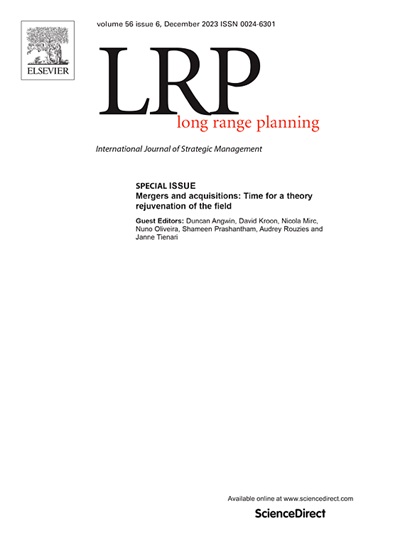保守的矛盾?国家党派冲突中CEO政治意识形态对战略冒险的影响
IF 6.3
2区 管理学
Q1 BUSINESS
引用次数: 0
摘要
美国政治日益加剧的两极分化导致经济学和金融学文献对其宏观经济影响进行了研究,揭示了一种违反直觉的效应:国家党派冲突降低了宏观经济的波动性,造成了立法僵局,降低了投资者对风险的感知。然而,对管理的影响仍然不清楚,因为没有研究试图解释公司对这一现象的反应的异质性。我们的理论认为,这是因为党派冲突导致了战略冒险的转变,这取决于首席执行官的风险厌恶和认知倾向的差异。根据上层理论,我们假设保守的首席执行官(典型的风险厌恶者)在与党派冲突相关的宏观经济条件下更愿意承担战略风险。一项从2000年到2022年对375家公司进行的研究支持了这一观点,该研究表明,当党派冲突加剧时,保守派首席执行官会转向风险更高的策略。这种效应不受行业效应的影响,不受其他政治和经济不确定性的影响。其他分析表明,这是由ceo的性格而非党派偏见驱动的,这支持了一种意识形态不对称、环境偶然机制,即党派冲突的转变增加了与保守主义相关的注意和认知倾向在决定公司层面冒险方面的重要性。这些发现扩展了党派冲突宏观层面研究的管理相关性,提供了理论解释,证明其对公司战略投资决策的表面上不可预测的影响。本文章由计算机程序翻译,如有差异,请以英文原文为准。
A conservative contradiction? The effect of CEO political ideology on strategic risk-taking during national partisan conflict
Increasing polarization in U.S. politics has led the economics and finance literatures to examine its macroeconomic implications, revealing a counterintuitive effect: national partisan conflict reduces macroeconomic volatility, creating legislative gridlock that lowers investors' perceptions of risk. However, implications for management remain unclear, as no research has sought to explain heterogeneity in firms' responses to this phenomenon. We theorize that this occurs because partisan conflict induces shifts in strategic risk-taking, contingent upon differences in CEOs' risk aversion and cognitive disposition. Drawing on upper echelons theory, we hypothesize that conservative CEOs, who are typically risk averse, will be more willing to take strategic risks under the macroeconomic conditions associated with partisan conflict. A study of 375 firms from 2000 to 2022 supports this, showing a shift towards higher-risk strategies among conservative CEOs when partisan conflict is high. This effect is robust to industry effects and independent from other political and economic uncertainties. Additional analyses indicate that this is driven by CEOs' disposition rather than party bias, supporting an ideologically asymmetric, environmentally contingent mechanism whereby shifts in partisan conflict increase the significance of the attentional and cognitive tendencies associated with conservatism in determining firm-level risk-taking. These findings extend the managerial relevance of macro-level research on partisan conflict, offering theoretical explanations that evince its ostensibly unpredictable effects on firms’ strategic investment decisions.
求助全文
通过发布文献求助,成功后即可免费获取论文全文。
去求助
来源期刊

Long Range Planning
Multiple-
CiteScore
13.00
自引率
7.10%
发文量
75
期刊介绍:
Long Range Planning (LRP) is an internationally renowned journal specializing in the field of strategic management. Since its establishment in 1968, the journal has consistently published original research, garnering a strong reputation among academics. LRP actively encourages the submission of articles that involve empirical research and theoretical perspectives, including studies that provide critical assessments and analysis of the current state of knowledge in crucial strategic areas. The primary user base of LRP primarily comprises individuals from academic backgrounds, with the journal playing a dual role within this community. Firstly, it serves as a platform for the dissemination of research findings among academic researchers. Secondly, it serves as a channel for the transmission of ideas that can be effectively utilized in educational settings. The articles published in LRP cater to a diverse audience, including practicing managers and students in professional programs. While some articles may focus on practical applications, others may primarily target academic researchers. LRP adopts an inclusive approach to empirical research, accepting studies that draw on various methodologies such as primary survey data, archival data, case studies, and recognized approaches to data collection.
 求助内容:
求助内容: 应助结果提醒方式:
应助结果提醒方式:


